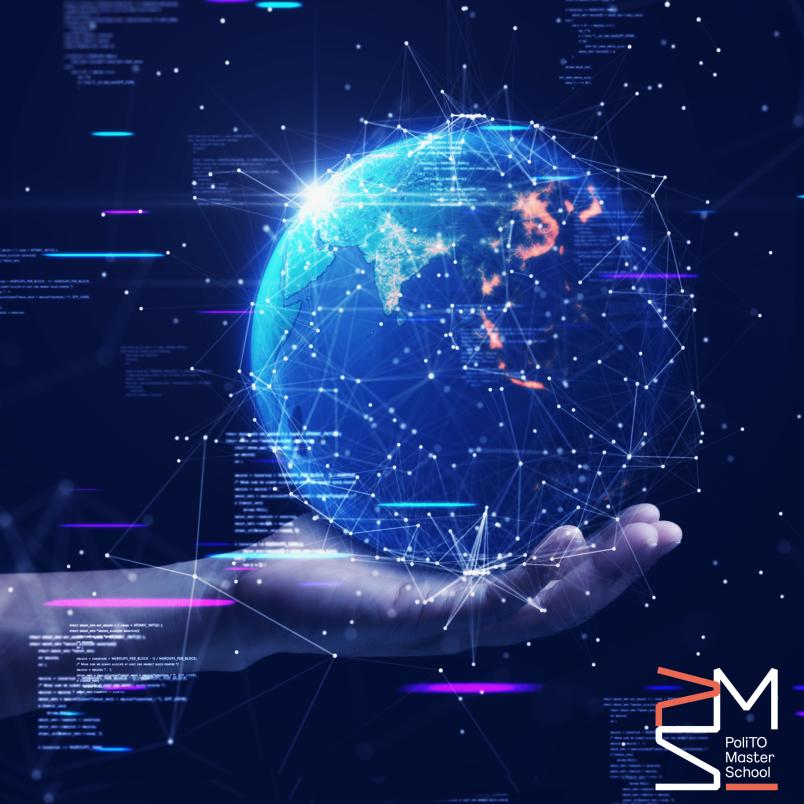
This course is designed, and delivered, as part of the "Lifelong Learning Initiatives" offer catalogue of the PNRR Innovation Ecosystem Project "NODES - Nord Ovest Digitale E Sostenibile". The subjects dealt with were assessed as capable of producing a considerable impact in terms of territories and industrial systems intercepted and generates the possibility of increasing the ability to share skills by creating a network of value on the territory.
The Programme
The agenda of the course includes 4 hours for 4 lessons, with the aim to provide basic elements on the technological factors that are driving innovation in the space and are contributing to the evolution of the value chain in the sector.
Over the last 10 years a radical transformation in technologies related to space infrastructures and space data has led to the emergence of new players and business models with great impact across various industries.
Several factors are driving innovation in the space sector and the transition from a tech-driven focus on upstream solution to market pull innovations is asking for the development of new advanced services. A strong digital drive opens new business opportunity and an expansion in services.
In this framework, Italy is sixth in the world and third in Europe for investments in the space economy/GDP. The Turin area is one of the main technology hubs in Europe for aerospace technologies with an aggregated employment of about 15,000 people. Over the next years considerable public and private investments will be channeled in this field and new skills will be requested.
Most important societal challenges might benefit from services based on data generated in space: from climate change investigation and management to digitalization and innovation needed by the modern society, in a context of sustainable and inclusive growth. The range of applications is wide if not infinite, supported by technology advance.
The objective of this short course is the provision of basic elements on the technological factors that are driving the innovation in space, evolving the space value chain. The mid-term goal is to prepare experts that will be able to grow the competitiveness of the industry, keeping the Turin and Piedmont hub at the leading edge on a worldwide market.
The course is designed for new hires or professionals (even with a more managerial background) who work for the first time on the design of micro satellites, or their components, and software applications related to their management, including data and image acquisition.
The Target
Maximum 15 students can be enrolled to this course
The course is addressed to companies in the aerospace sector that work with communications and satellite navigation systems applications. The topics covered during the lessons enable an overall vision of the subject and its technological evolution in the medium term. In particular, the course aims to break down the knowledge silos that hinder, for various players in the supply chain, an effective management of the interdependencies that intervene in the design and operation phases of upstream systems (space and satellites as infrastructure) and downstream (communication systems /navigation/Earth observation) of aerospace.
The Program in Detail
| DATE | TIMETABLE | TOPIC | PROFESSOR |
|---|---|---|---|
| Friday 9th February | h 14:30 |
Introduction: Space Engineering in the New Space Economy scenario Understanding the technological trajectories (1): the digital revolution in space
|
Prof. Corpino |
| Friday 16th February | h 14:30 |
Understanding the technological trajectories (2): micro and nano satellites
|
Prof. Dovis |
| Friday 23rd February | h 14:30 |
New Space-based applications and services for the Society and the Planet Overview of trends in SPACE economy and introduction to the three main pillars Earth Observation
Satellite communications
|
Prof. Dovis |
| Friday 1st March | H 14:30 |
Satellite navigation: the GNSS revolution
Navigation systems for Space Exploration and access to space |
Prof. Corpino |
-
Application:
Closed -
Time schedule:
from the 2nd to the 23rd February -
Campus:
Online -
Duration:
16 hours - 4 hours each Friday -
Language:
English -
Format:
Part-time -
Partecipation fee:
400 € -
Scientific coordinator:
-
Edition n°:
1
